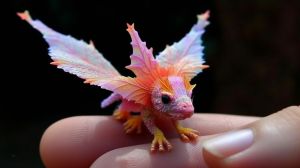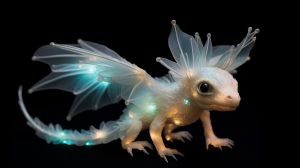Fluragon
"It's a flower, it's a dragon, it's a flower dragon! I'm calling her Blossom." - Iliyana Rosser, daughter of Celyddon Rosser, author of Enchanted Fauna
Fluragons, also known as Flower Dragons, are a fascinating species of dragon that have been discovered in recent years. They are unique in that they resemble flowers, with brightly colored petals as wings and elicate, intricate features.They are pollinators and play a crucial role in the ecosystem of meadows and gardens.
Physical Description
Fluragons are small, reaching only about 3-4 inches in length. They are often mistaken for real flowers due to their petals, which come in a variety of colors such as pink, purple, yellow, and blue. Their bodies are slender and delicate, with long antennae and tiny, clawed feet. Their wings are thin and translucent, with veins running through them like a leaf.
The most common species of Fluragon in Britain is F. pollinifera, a diurnal species usually found on wild meadows.
F. noctilucentis is a relatively rare nocturnal species of Fluragon. They are pearly white with transparent wings and bioluminescent spots.
Habitat
Fluragons can be found in meadows, forests and gardens throughout the world, but are most commonly found in areas with a wide variety of flowering plants. They are social creatures and often travel in groups, visiting different flowers and pollinating as they go. They prefer warm, sunny environments and are most active during the day.
Uses
Fluragons have been highly valued for their role in pollination, and have been known to increase the yield of crops and gardens in areas where they are present. Additionally, their brightly colored petals are highly sought after for use in potion-making and as a decorative element in various wizarding crafts. However, it is important to note that capturing or harming these creatures is strictly forbidden, as they are protected under wizarding law.


